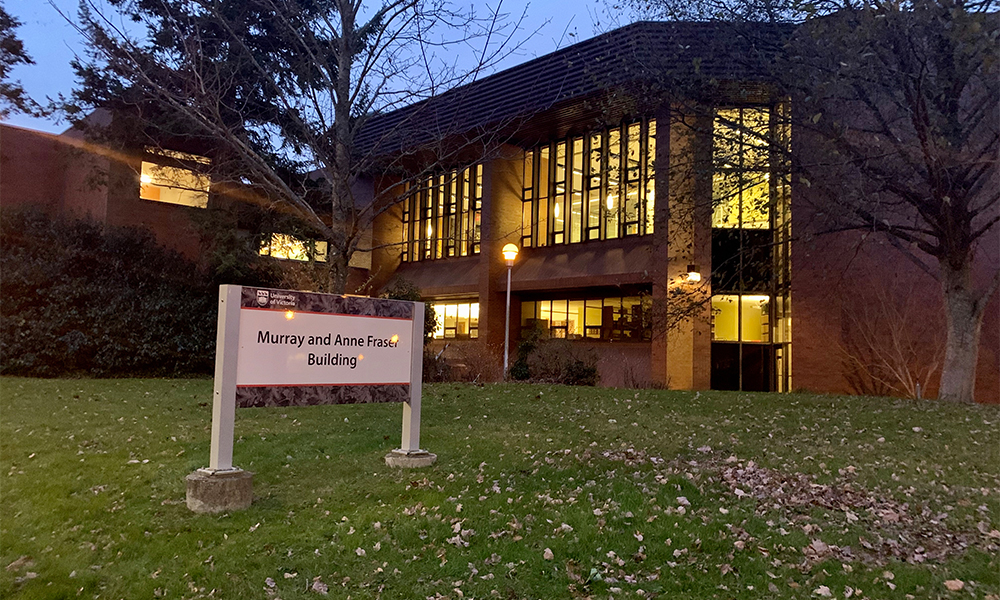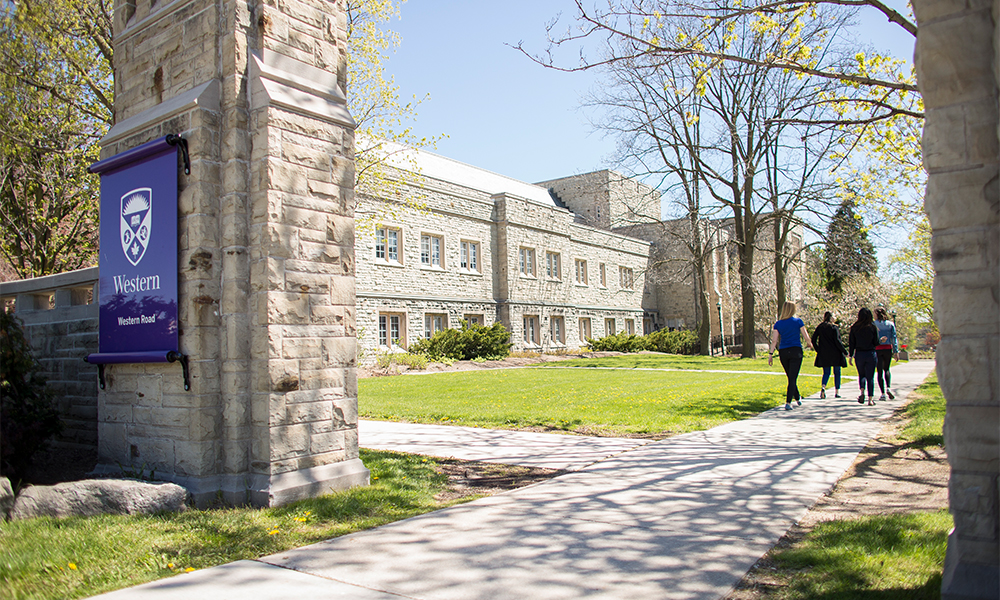A comprehensive list of law school programs in Canada
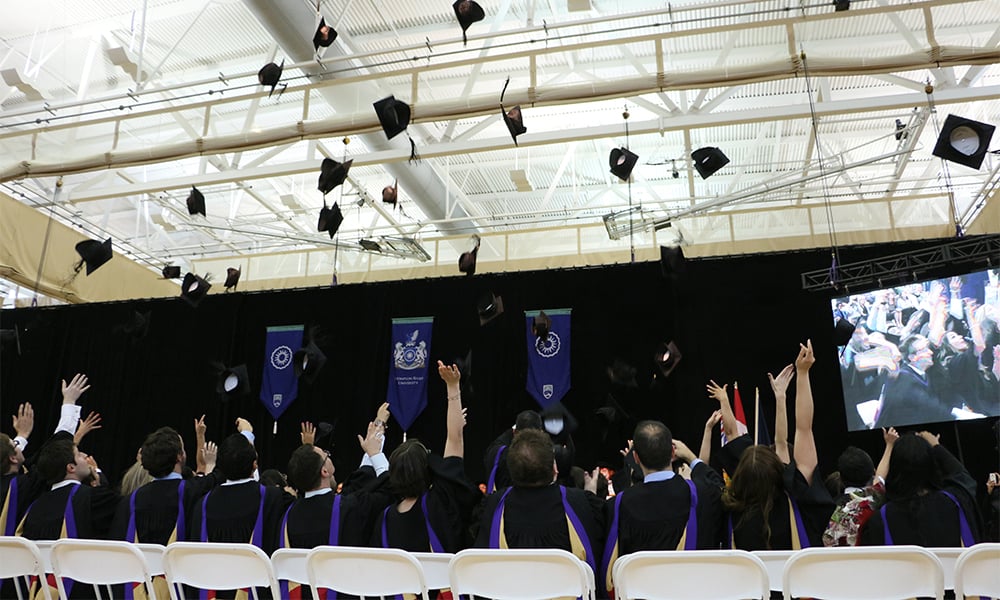
For more up to date information see Canadian law schools 2021/22: Resources if you're considering whether, and where, to become a lawyer.
To help aspiring lawyers inform their law school admissions decisions, Canadian Lawyer has compiled a list of all 24 law schools in Canada, including their tuition figures, key faculty members, joint degree programs and licensure requirements in the respective provinces.
Introduction
There are seemingly endless considerations when it comes to going to law school — how much can I spend? Can I afford to spend 4 years out of the workforce? Do I want to stay close to home or go far away? How much does “brand” really matter when it comes to what school you put on your resume?
Luckily, say lawyers, it’s hard to go wrong: Seventy-three per cent of readers in a recent Law Times poll said they had no regrets about their choice of law school.
Ari Blicker, director of student and associate programs at Aird & Berlis LLP, says the articling students at his firm gave similar feedback.
“They have no regrets and they are happy with their choice,” says Blicker.
“As one of the students said, it's really more art than science in making this decision. It's a little messy — you're making a complex decision with imperfect information. It's a decision that has implications. But on the positive side, everybody was saying, ‘Look, there are so many great law schools in this country.’ We're very fortunate that you can't really go wrong with your choices. You just have to make the most of them.”
Blicker asked the articling students how they made their decision to go to law school, and they cited tuition, financial aid and bursaries, advice from trusted friends and from students and alumni — but also lifestyle choices, such as availability of student life activities, creative outlets and social networks. Citing Malcolm Gladwell, Blicker notes that prestige and rankings aren’t everything. For example, diversity and inclusion programs, specified upper-year elective streams on technology or aboriginal law, or job outcomes for graduates were deciding factors for articling students with whom he spoke.
“Think about what your own goals are, and what you're like as a person and the environments you thrive in, and maybe the ways that you wish to challenge yourself,” says Blicker.
“[The articling students] placed a lot of emphasis on reputation. And they wouldn't necessarily go back and do anything different, but they realize now that [reputation] matters less than they thought . . . . going to the top-ranked school isn't always the best choice for everybody. Sometimes they might be better off and another fantastic school that is maybe a little less competitive in terms of the atmosphere within the school.”
Alison Bennett, director at The Counsel Network in Calgary, estimates she has read more than 10,000 resumes in her lifetime and has hired candidates from every university in Canada during her career. She says some firms are looking for specific coursework, while others are more interested in what students are doing in the community.
“If you're a Bay Street firm you're likely going to want to see somebody from a top Canadian school, maybe U of T, McGill, with strong business courses. I know when we hired, we really tried to find people who are quite well rounded,” she says.
Bennett says that people who contribute to the law school community tend to also contribute well to a law firm’s culture.
“I think if you think you want to do litigation, a clinic is a really fantastic experience. And it will teach you early if you really are going to like it or not,” she says.
“In terms of hiring, my preference always has been to find people or identify people who got the most out of an experience: who came in to do more than just get a mark; people who were actually part of the law school community, and made friends. Maybe did law review or organized the law school show — whatever it was, whether it was really social, or more academic in nature, or sports or clinic.”
On-campus recruiting process is a very important consideration, Bennett says, given that it is available on a predictable cycle within Canadian schools but not always for Canadians attending school abroad. Going to a local law school and pursuing a study abroad program in a big city can be a good cost-saving measure for students hoping to add a little adventure to their experience.
Singapore-based lawyer Daniel Lo, who previously worked in-house in Hong Kong and private practice in Canada, is the co-founder of Global Lawyers of Canada. He offered a contrasting view, noting that perhaps an overseas law school would be best for you if you want to eventually move and practice there.
“Choose your law school based on the strength of its course offerings to the area of practice you want to pursue (tech and IP, aboriginal rights, etc.), but also consider the geography and whether you want to get a head start on an international career,” said Lo. “The benefits of studying law abroad is not only practical for foreign qualification purposes, but you can also start to develop your international network at an early stage in your career.”
Geography can also be a big consideration within Canada, says Chris McKenna, Manager, student recruitment and programs in the Toronto office of Bennett Jones LLP in Toronto.
“I think there's a general appreciation that schools have more gravitas or yield more success in particular markets. Most of the time, it's the domestic market. So, for example, if you were in Vancouver and you go to UBC, I think there's a general thought that you would have a greater level of success,” he says.
“But a lot of law schools in Canada — whether it be throughout Ontario, east coast, west coast — provide very competitive programs that allow for students to take education or adopt education extra provincially, and then have good opportunities to return back into their hometown, or domestic market, for future work. Halifax and Dalhousie and UBC in Vancouver . . . . McGill in Montreal are all examples of law schools that have positioned themselves quite well nationally. Students attending those law schools, I include U of T, too . . . . will put on separate recruits for students in their home market or in their specific school market to potentially obtain employment in other markets.”
McKenna says that students should be aware that their earning power is based on where they end up practising, not necessarily where they go to school or how many degrees they have. An exception would be for students looking to practice in New York, says McKenna, from where recruiters specifically come to certain Canadian schools and favour extra experience in academia or through clerkships.
“The financial investment of law school should be weighed in context with the financial outcome, or the potential financial outcomes associated with securing future employment. So, just because you're going to U of T and get a job in Toronto doesn't mean you get paid more than a student that went to UBC for a fraction of the tuition,” he says.
“Equally true of students who pursue joint degrees in Canada. A joint degree is considered to be, obviously, of tremendous value. Its upside is largely attached to substantive knowledge and general appreciation for the law in other jurisdictions, which inevitably helps inform your appreciation of the law. So, it's quite interdisciplinary, whether you have a master's or have a joint degree where you're learning somewhere else. You don't often find an immediate financial return for that master's in private practice . . . [out of school] you're probably not going to be asked domestically in Canada to immediately opine on the practices and laws within other jurisdictions.”
Looking to the future, in-house lawyer Fernando Garcia says students should consider that private practice is not the only legal career available these days, particularly when weighing an established program against a newer program like Ryerson University’s — which bypasses articling requirements and offers curriculum on innovation. For him, saving money, avoiding the slog of the LSAT (he was already a working professional when applying to law school) and the availability of a joint degree helped him choose McGill.
“I think I would have focused a little more on broader topics [in law school]. You tend to focus on the things that you're comfortable with, because you want to get a good grade. You want to get out there and get practicing,” he says. “A worse grade could affect you getting a job in a law firm. It's a tough balance, but . . . . the future is very uncertain. You don't know where you're going to go, you don't know where you're going to end up, you don't know what you're going to be doing. So, the broader your skill set, I think the more value you bring to the table.”
LIST OF CANADIAN LAW SCHOOLS, IN ALPHABETICAL ORDER:
University of Alberta – Faculty of Law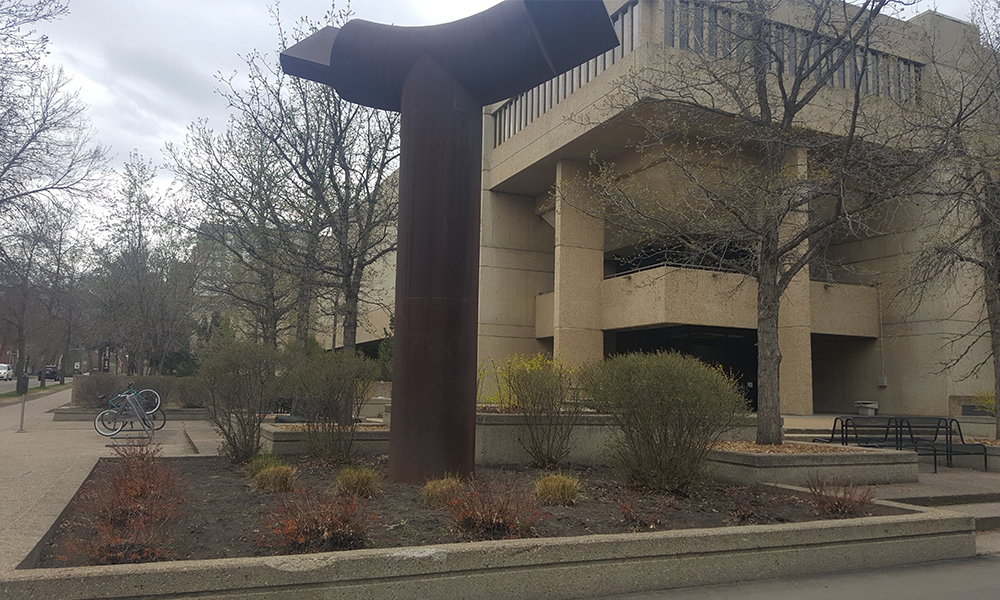
LOCATION:
Edmonton, Alberta (licensure requirements)
TUITION RATES:
Estimated annual tuition & fees for Canadian Juris Doctor students is approximately $13,500 per year (2019).
-
Internationally Trained Lawyer Pathway (Tuition: $40,000)
NOTABLE FACULTY MEMBERS:
OTHER INFORMATION:
University of British Columbia – Faculty of Law (Peter A. Allard School of Law)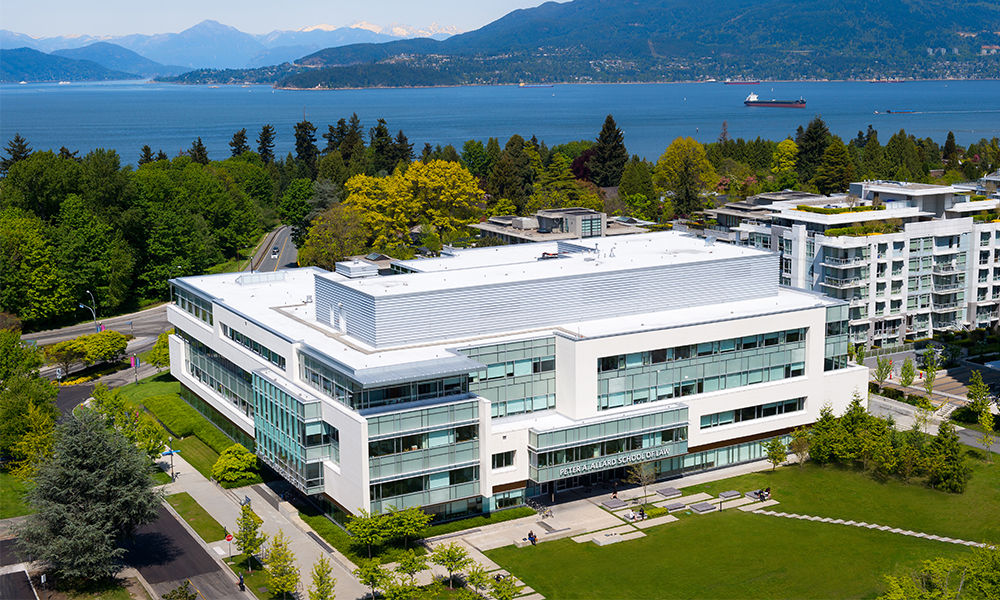
LOCATION:
Vancouver, British Columbia (licensure requirements)
LAW DEGREES AND ADMISSION REQUIREMENTS:
TUITION RATES:
Tuition for domestic JD students in 2019-2020 is $12,639.36 for first year and $11,849.40 for each of second and third year (for international students, it is $35,923.43 for first year and $33,678.00 for each of second and third year).
NOTABLE FACULTY MEMBERS:
OTHER INFORMATION:
The law school offers a wide range of experiential learning opportunities, such as legal clinics that provide students with hands-on learning experiences with real clients, moots and exchange opportunities. The law school’s program has a strong focus on Indigenous legal studies. In terms of financial assistance, the law school offers approximately $1,000,000 in bursaries.
University of Calgary – Faculty of Law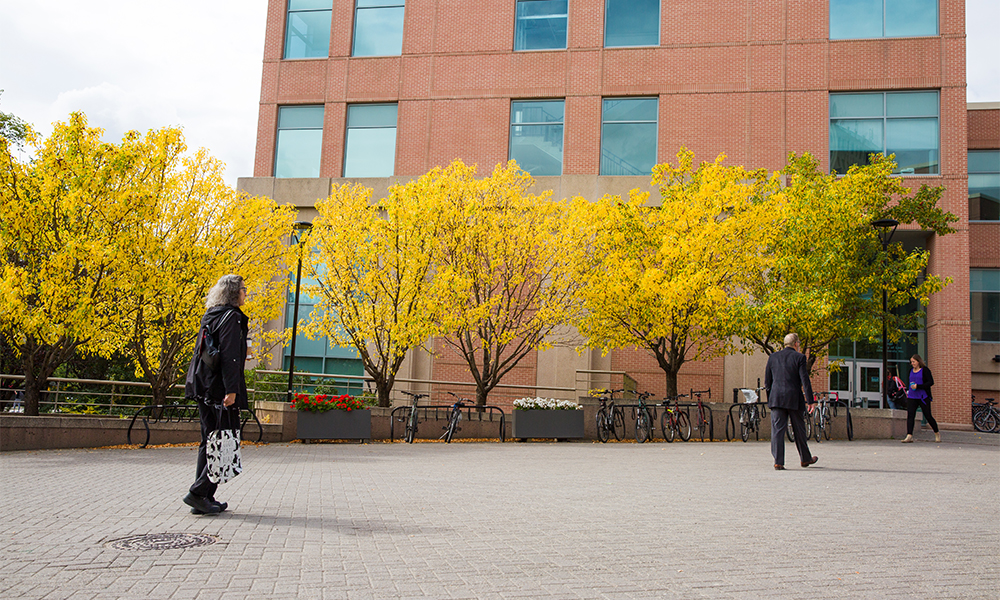
LOCATION:
Calgary, Alberta (licensure requirements)
LAW DEGREES AND ADMISSION REQUIREMENTS:
-
Certification in Common Law in French in partnership with the University of Ottawa
TUITION RATES:
Tuition and fees for the JD program are approximately $14,600 for new Canadian students and $14,400 for continuing Canadian students in 2020-2021.
NOTABLE FACULTY MEMBERS:
OTHER INFORMATION:
The law school offers its International Energy Lawyers Program in partnership with the University of Houston. Other unique courses and programs in the law school include the following: Crisis Communications for Lawyers, Marketing and Client Development, Indigenous Legal Traditions, the Institute for the Future of Law Practice Program, Decision Making – Alberta Utilities Commission and Indigenous Business Law.
The law school also offers learning experiences seeking to engage students through technology and innovation.
Information about the demographic makeup of the class of 2022 may be found here.
Dalhousie University – Schulich School of Law
LOCATION:
Halifax, Nova Scotia (licensure requirements)
LAW DEGREES AND ADMISSION REQUIREMENTS:
TUITION RATES:
Tuition and fees for full-time law students (not LLM or PhD) in 2019-2020 are $20,007.46 (Students who are not Canadian citizens or permanent residents are also required to pay an additional international tuition fee.)
Information found here.
NOTABLE FACULTY MEMBERS:
OTHER INFORMATION:
More information about the law school can be found here.
Lakehead University – Faculty of Law (Bora Laskin Faculty of Law)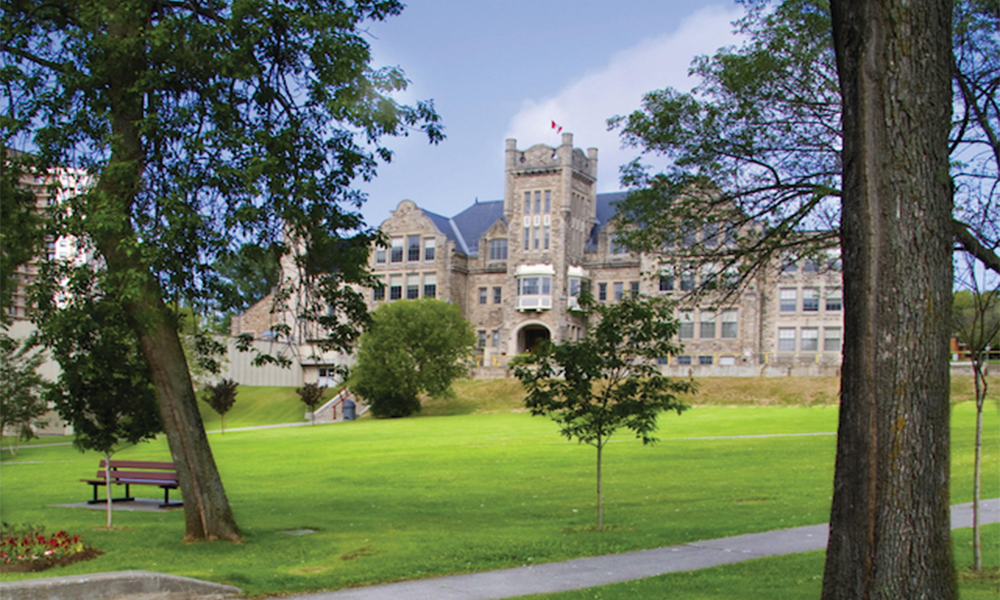
LOCATION:
Thunder Bay, Ontario (licensure requirements)
LAW DEGREE AND ADMISSION REQUIREMENTS:
Juris Doctor (JD)
TUITION RATES:
Year 1:
-
Tuition — $16,734.43
-
Ancillary fees — $1,199.37
-
Total — $17,933.80
Year 2:
-
Tuition — $15,796.28
-
Ancillary fees — $1,179.37
-
Total — $16,975.65
Year 3:
-
Tuition — $15,796.28
-
Ancillary fees — $1,179.37
-
Total — $16,975.65
NOTABLE FACULTY MEMBERS:
OTHER INFORMATION:
The law school, which is the newest in the country, centres its program on three mandates, chosen due to the school’s Northern location:
-
Aboriginal and Indigenous law
-
Natural resources and environmental law
-
Sole or small firm practice, with an integrated practice curriculum
The law school had implemented mandatory courses in Aboriginal and Indigenous laws even before the Calls to Action by the Truth and Reconciliation Commission of Canada.
The law school’s Integrated Practice Curriculum is the first in Canada to include legal professional training in the curriculum, which consequently qualifies graduates to take the bar examinations without needing to article with a law firm.
Through the school’s student legal clinic, Lakehead University Community Legal Services, students gain hands-on experience by offering free legal services to low-income residents of Northwestern Ontario.
In accordance with its commitment to access and equity for a diverse student body, 99 per cent of students have at least one under-represented characteristic, while 65 per cent have multiple under-represented characteristics.
Université Laval – Baccalauréat en Droit
LOCATION:
Quebec City, Quebec (licensure requirements)
LAW DEGREES AND ADMISSION REQUIREMENTS:
TUITION RATES:
Quebec resident students
-
Bachelor of Laws (99 credits): $1,728
-
Master of Laws (45 credits): $1,816
-
Doctor of Laws (90 credits): $1,644
French and Belgian students
-
Bachelor of Laws (99 credits): $4,426
-
Master of Laws (45 credits): $1,816
-
Doctor of Laws (90 credits): $1,644
-
Canadian students (excluding Quebec)
-
Bachelor of Laws (99 credits): $4,426
-
Master of Laws (45 credits) $4,426
-
Doctor of Laws (90 credits): $1,644
International students
-
Bachelor of Laws (99 credits): $11,031
-
Master of Laws (45 credits): $8,190
-
Doctor of Laws (90 credits): $1,644
NOTABLE FACULTY MEMBERS:
Other information:
Considering itself a francophone leader in North America, the school accepts about 400 students per year, coming from all continents. With an emphasis on social justice and sustainable development, the law school focuses on not just the theoretical side of law, but also gives its students hands-on learning experiences such as legal clinic courses, moot courts and externships.
The school also offers four dual degrees, during which students spend a semester in one of four French partner universities: Université Paris 1 Panthéon-Sorbonne, to focus on environmental law, sustainable development and food safety; Université de Bordeaux, to focus on the law of transatlantic relationships; Université Paris-Saclay, to focus on intellectual property law and digital technologies; and Université Toulouse Capitole, to focus on penal law and criminal sciences.
University of Manitoba – Robson Hall Faculty of Law
LOCATION:
Winnipeg, Manitoba (licensure requirements)
ADMISSION REQUIREMENTS:
Information found here.
LAW DEGREES:
-
Juris Doctor (JD)
-
Master of Laws (LLM)
-
Master of Human Rights (MHR)
TUITION RATES:
Tuition fees of $11,700 for Canadians and permanent residents for the 2019-2020 academic year ($27,200 for international students)
NOTABLE FACULTY MEMBERS:
McGill University – Faculty of Law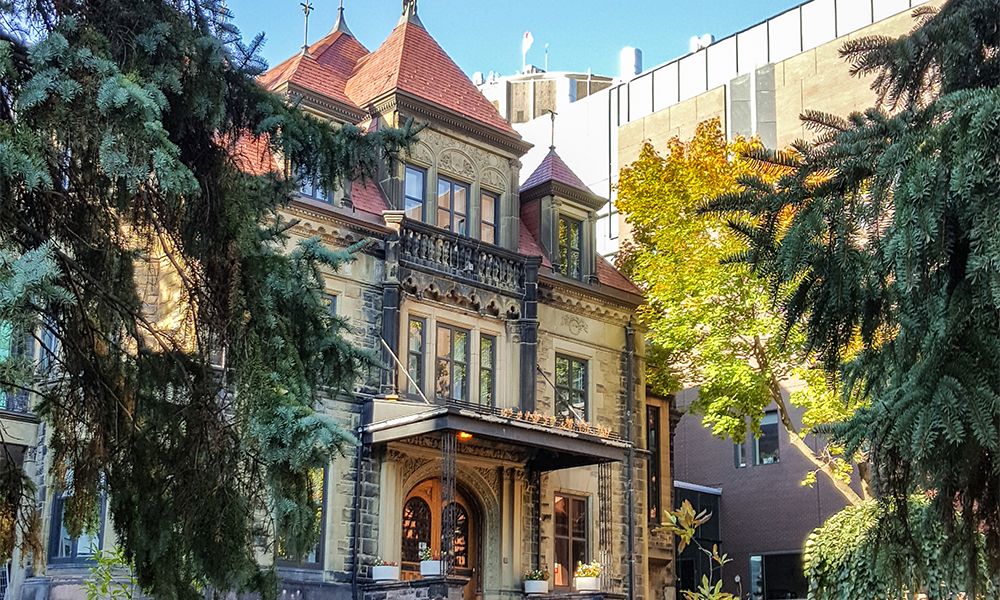
LOCATION:
Montreal, Quebec (licensure requirements)
LAW DEGREES AND ADMISSION REQUIREMENTS:
-
Doctor of Civil Law - Law
-
Doctor of Civil Law - Comparative Law
-
Doctor of Civil Law - Air and Space Law
TUITION RATES:
BCL/JD program:
-
Quebec residents: $4,759.19/year
-
Canadian residents (outside of Quebec): $10,155.29/year
-
International students: $45,573.29/year
-
Quebec residents: $4,430.59/year
-
Canadian residents (outside of Quebec): $9,826.69/year
-
International students: $ 20,861.49/year
-
Quebec residents: $4,430.59/year
-
Canadian residents (outside of Quebec): $4,430.59/year
-
International students: $18,388.29/year
NOTABLE FACULTY MEMBERS:
Other information:
Graduates of the law school’s bilingual program will obtain both a Juris Doctor and a Bachelor of Civil Law degree. The school therefore requires “passive bilingualism” of future students.
A full list of the law school’s courses may be found here, while details of the law school’s class and alumni profiles for 2019 may be found here.
The law school holds activities such as its Integration Week, which prepares first-year students through introductory lectures and small group workshops, as well as its elective Focus Week workshops, in which upper-year students learn about practical skills such as negotiation, mediation, electronic discovery and evidence gathering.
The McGill Centre for Human Rights and Legal Pluralism offers learning opportunities like international human rights internships and international judicial clerkships.
Université de Moncton – Faculté de Droit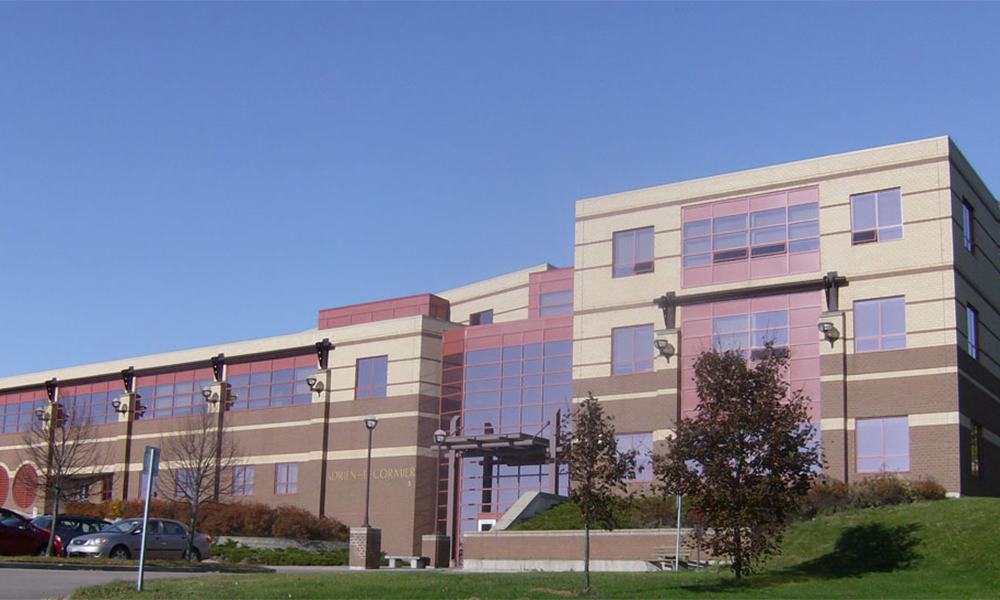
LOCATION:
Moncton, New Brunswick (licensure requirements)
ADMISSION REQUIREMENTS:
Information found here.
LAW DEGREES:
-
Juris Doctor (JD)
-
Master of Laws (LLM)
-
Juris Doctor and Master of Business Administration (JD-MBA)
-
Juris Doctor and Master of Public Administration (JD-MAP)
-
Juris Doctor and Master of Environmental Studies (JD-MEE)
-
Diplôme d'études en common law (DECL)
TUITION RATES:
$6,423 (and other miscellaneous fees)
NOTABLE FACULTY MEMBERS:
OTHER INFORMATION:
The law school offers training in common law solely in French. Upon graduation, students will be equipped with the necessary skills to exercise their legal profession in both French and English.
The law school is relatively small, with around 130 students from Canada, Africa and Europe. The students all know each other because they are often required to collaborate in small groups. The students will have the opportunity to be involved in the faculty’s research activities, both during their time in school and during their professional lives.
Université de Montréal – Faculté de Droit
LOCATION:
Montreal, Quebec (licensure requirements)
LAW DEGREES AND ADMISSION REQUIREMENTS:
TUITION RATES:
Quebec Students
-
$1,195 per session
-
$425 per thesis session
Non-Quebec Canadian Students
-
$3,701 per session
-
$425 per thesis session
International Students
-
$8,186 per session (Masters)
-
$7,348 per session (PhD)
-
$425 per thesis session
NOTABLE FACULTY MEMBERS:
University of New Brunswick – Faculty of Law
LOCATION:
Fredericton, New Brunswick (licensure requirements)
TUITION RATES:
Tuition and fees for both 2019-2020 terms for full-time law degrees is $12,597.50 per year for Canadians and $22,531.00 for international students.
NOTABLE FACULTY MEMBERS:
University of Ottawa – Common Law
LOCATION:
Ottawa, Ontario (licensure requirements)
ADMISSION REQUIREMENTS:
Information found here.
LAW DEGREES:
TUITION RATES:
Tuition fees are calculated based on how far you have progressed in the program.
NOTABLE FACULTY MEMBERS:
OTHER INFORMATION:
The common law program in French admits around 80 new students per year. Taking the LSAT is not a requirement for acceptance.
The law school offers numerous opportunities for active learning, including legal clinics, law mentorship programs, legal writing programs, moot courts, internships, a law practice program and a pro bono national student network program.
University of Ottawa – Droit civil
LOCATION:
Ottawa, Ontario (licensure requirements)
ADMISSION REQUIREMENTS:
Information found here.
LAW DEGREES:
TUITION RATES:
Information found here.
NOTABLE FACULTY MEMBERS:
Université du Québec à Montréal – Faculté de science politique et de droit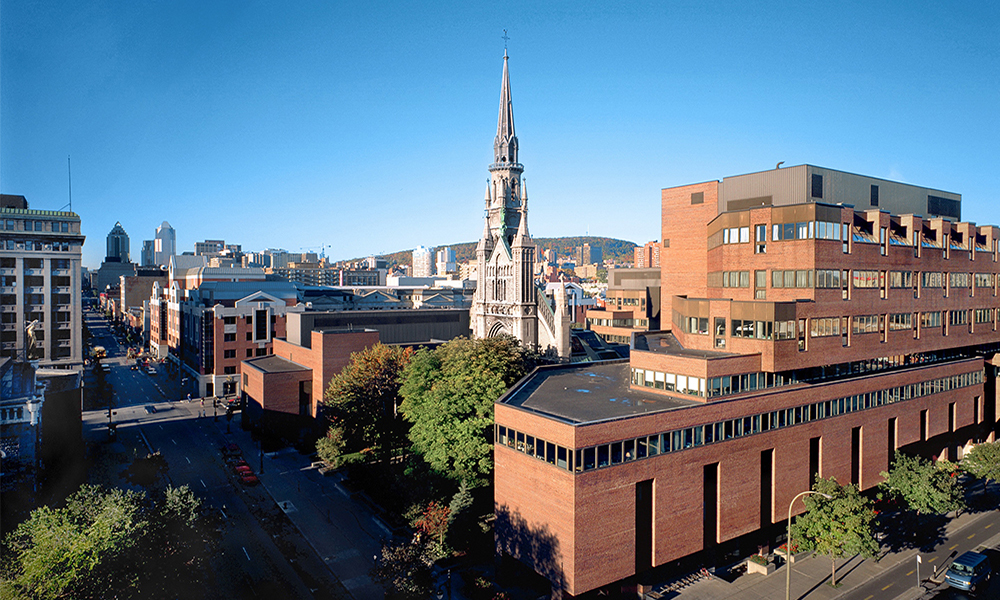
LOCATION:
Montreal, Quebec (licensure requirements)
LAW DEGREES AND ADMISSION REQUIREMENTS:
Undergraduate program
-
Certificate in Social and Labour Law
-
Bachelor in International Relations and International Law
-
Bachelor of Laws – Beginning September 2020, students may apply for one of the following concentrations: women’s studies, Indigenous studies, ethnic studies and international communications.
Graduate program
Short programs
-
Labour and Social Protection Law
-
Human Rights
Specialized graduate diplomas (DESS)
-
Labour and Social Protection Law
-
Human Rights
Master’s program
-
Master of Laws, thesis option – Beginning September 2020, students may apply for one of the following concentrations: labour law, international law and law and society.
-
Master of Laws, non-thesis option – concentration in international law and international politics
Doctoral program
Doctorate of Law (PhD)
TUITION RATES:
Undergraduate program (5 courses):
-
Quebecer or permanent resident of Quebec: $1,612.09/semester
-
Canadian or permanent resident (non-resident of Quebec): $4,310.14/semester
Master’s program (5 courses):
-
Quebecer or permanent resident: $1,612.09/semester
-
Canadian or permanent resident (non-resident of Quebec): $4,310.14/semester
Doctoral program:
-
Quebecer or permanent resident: $1,256.29/semester
-
Canadian or permanent resident (non-resident of Quebec): $1,256.29/semester
Notable faculty members:
OTHER INFORMATION:
The school’s Bachelor of Laws program was revamped in 2019, with a new emphasis on producing lawyers committed to social justice. The school is selective in its admissions process, with an average annual admission rate of 26 per cent.
In spite of the relatively small size of the law school, its students have participated in many prestigious international simulations and moot court competitions, garnering many awards and distinctions in these events.
The law school offers a range of legal clinics: the UQAM Legal Clinic, the International Human Rights Clinic, UQAM Pro Bono, Innocence Quebec Project and the Mobile Legal Clinic.
Notable alumni of the law school include Lucie Fournier, Quebec Court of Appeal judge; Ann-Marie Jones, chairperson of the Human Rights Tribunal; and Guy Cournoyer, Superior Court of Quebec judge.
Queen’s University – Faculty of Law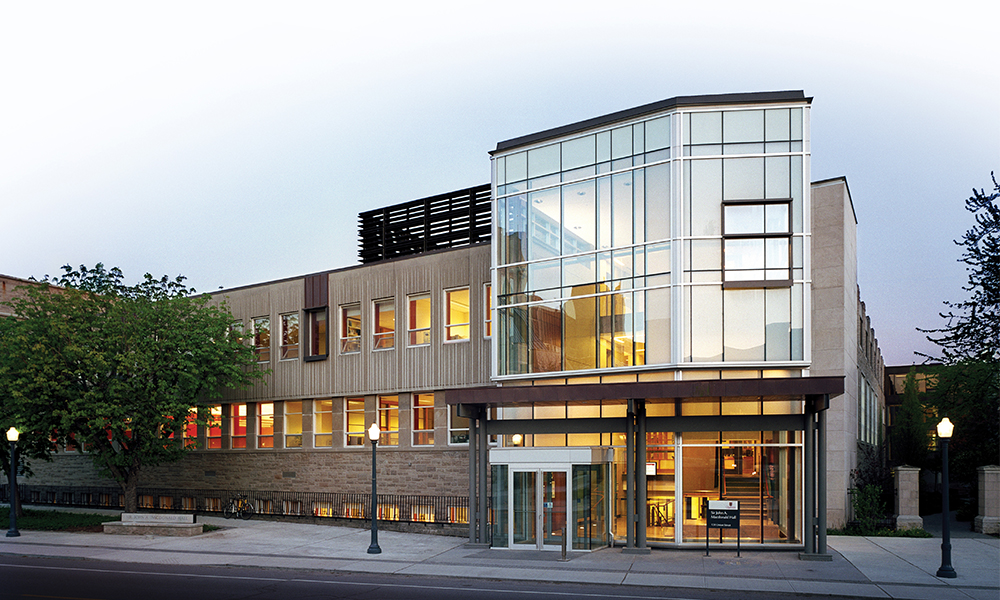
LOCATION:
Kingston, Ontario (licensure requirements)
LAW DEGREES AND ADMISSION REQUIREMENTS:
TUITION RATES:
-
Juris Doctor (JD) – $18,287.66.
-
Master of Laws (LLM) – $7,108.34.
NOTABLE FACULTY MEMBERS:
OTHER INFORMATION:
The law school offers two international law programs, in which students are sent to the Bader International Study Centre in Herstmonceux Castle in England for an eight-week course that features international law class studies, as well as field studies to important legal bodies.
The law school is currently developing a Graduate Diploma in Immigration and Citizenship Law, set to be launched in January 2021. Once implemented, it will be the only English-language pathway to certification as an immigration consultant in Canada.
In terms of its admissions process, the law school’s Access Category prioritizes applicants with diverse backgrounds, qualities and experiences. Information about the school’s class profile for its latest first year batch may be found here.
The law school prides itself in achieving around 95 per cent placement rates per graduating class, as of the September following graduation.
The law school also has unique legal clinics in place, such as the only prison law clinic and one of only two elder law clinics in the country.
Ryerson University – Faculty of Law
LOCATION:
Toronto, Ontario (licensure requirements)
LAW DEGREES AND ADMISSION REQUIREMENTS:
Juris Doctor (JD)
TUITION RATES:
Information found here.
-
Canadian citizens and permanent residents – $21,168 (OSAP eligible) (plus ancillary and related fees)
-
International students – $31,168 (plus ancillary and related fees)
NOTABLE FACULTY MEMBERS:
Other information:
The law school has adopted a holistic approach to admissions in that it considers the best two years in terms of the applicant’s GPA. An online interview is an additional feature.
The law school is focused on producing graduates equipped with the necessary technological and entrepreneurial skills that will distinguish them as they embark on their legal careers and that will enable them to come up with unique legal solutions to their clients’ problems.
Program offerings include a technology innovation bootcamp, a coding bootcamp, and an emotional and cultural quotient bootcamp. Note: The space for the future law school is currently under construction.
Information on scholarships offered by the law school may be found here.
University of Saskatchewan – College of Law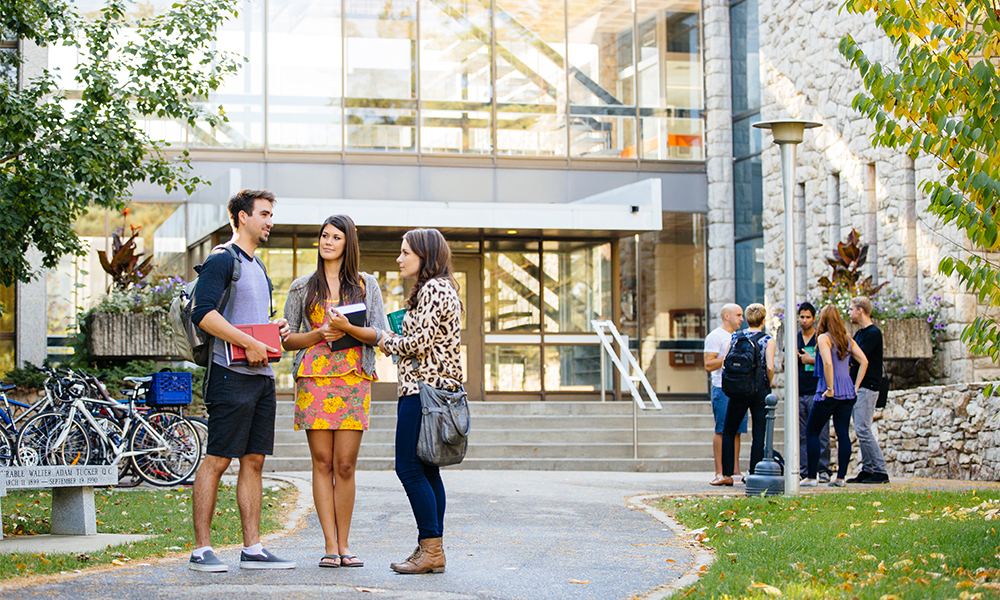
LOCATION:
Saskatoon, Saskatchewan (licensure requirements)
LAW DEGREES AND ADMISSION REQUIREMENTS:
-
Certification in common law in French (CCLF) in partnership with the University of Ottawa
-
Bachelor of Commerce and Juris Doctor (BComm/JD)
-
Bachelor of Business Administration and Juris Doctor (BBA/JD)
-
Juris Doctor and Masters of Business Administration (JD/MBA)
-
Bachelor of Arts and Juris Doctor or Bachelor of Science and Juris Doctor (BA/JD or BSc/JD)
-
Bachelor of Arts (four-year) and Juris Doctor
TUITION RATES:
-
Juris Doctor (JD) – $14,064, plus fees of $947
NOTABLE FACULTY MEMBERS:
OTHER INFORMATION:
The law school has committed to annually reserving two seats in JD program for Indigenous students from Newfoundland and Labrador.
The law school offers a number of unique financial aid opportunities, including a scholarship for applicants self-declaring as LGBT persons, funded by alumni and married couple Brad Berg and Brian Rolfes. The law school also has the Nicole L. Thornbury Memorial Bursary, for students graduating from a Newfoundland high school, and the J. Barrie Thomson Scholarship, for students interested in the field of agriculture.
Special programs provided by the law school include the Kwayeskastasowin Setting Things Right course, the Nunavut Law Program and the Dean’s Forum on Dispute Resolution and Access to Justice. The Dean’s Forum gives students the chance to interact with important stakeholders in the justice system to discuss access to justice issues.
The law school’s Ariel F. Sallows Chair in Human Rights is the first endowed chair of human rights in any law school across Canada.
Université de Sherbrooke – Faculté de droit
LOCATION:
Sherbrooke, Quebec (licensure requirements)
LAW DEGREES AND ADMISSION REQUIREMENTS:
First Cycle - Bachelor of Laws
Second Cycle - Course Type
-
Maîtrise en environnement
-
Maîtrise en médiation interculturelle
Second Cycle - Research Type
TUITION RATES:
Information found here.
NOTABLE FACULTY MEMBERS:
Thompson Rivers University – Faculty of Law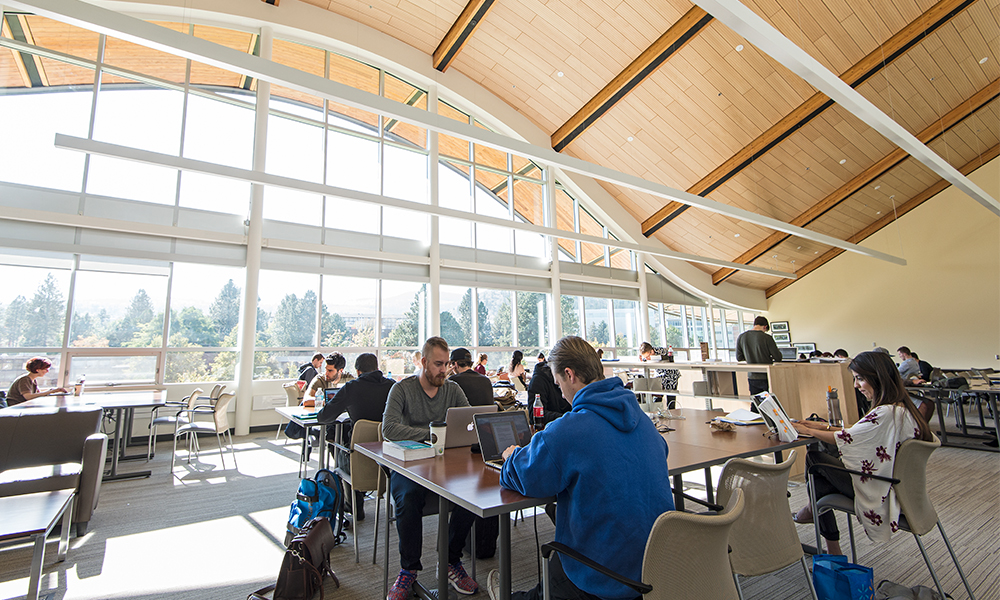
LOCATION:
Kamloops, British Columbia (licensure requirements)
LAW DEGREES AND ADMISSION REQUIREMENTS:
Juris Doctor (JD)
TUITION RATES:
$20,902. More information found here.
NOTABLE FACULTY MEMBERS:
OTHER INFORMATION:
JD students will have the opportunity to take classes exploring various fields of law, including entertainment law, media law, Indigenous law, animal law, construction law, sports law and video gaming law. A full list of the courses offered by the law school may be found here.
Students may also have experiential learning opportunities such as moot competitions and community legal clinic experience.
For the academic year 2019–2020, the law school has 337 students, 53 per cent of which are female.
Eligible students may avail of, or may benefit from, financial aid in the form of awards, bursaries, entrance awards and prizes and external awards.
University of Toronto – Faculty of Law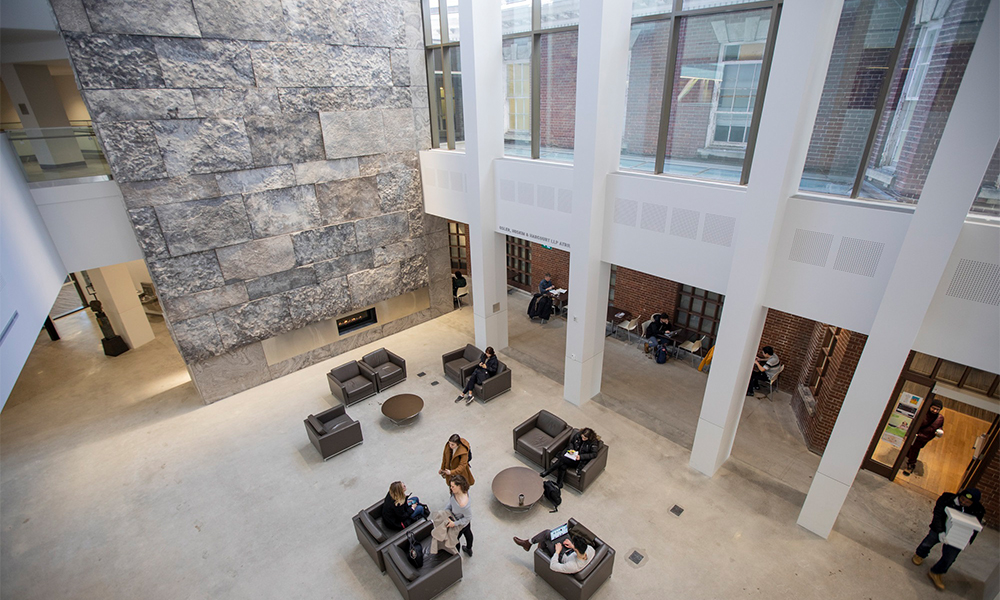
LOCATION:
Toronto, Ontario (licensure requirements)
LAW DEGREES AND ADMISSIONS REQUIREMENTS:
TUITION RATES:
Juris Doctor (JD) Fees of 34,634.86 for first-year domestic students (2019 to 2020) and $34,584.86 for upper-year students. The 2020-2021 tuition fees are not expected to change from the 2019-2020 amounts. For international students, first year (2019 to 2020) is $53,960.8 6 and $53,910.86 for upper-year students.
Graduate program (LLM, SJD, MSL, GPLLM) domestic student 2019-2020 tuition and fees
-
LLM: $10,920.90
-
SJD: $7,850.90
-
MSL: $10,920.90
-
GPLLM: $35,210.90
-
for international students
-
LLM: $42,606.90
-
SJD: $8,486.90
-
MSL: $29,566.90
-
GPLLM: $64,046.90
NOTABLE FACULTY MEMBERS:
OTHER INFORMATION:
The law school is the only one in Ontario that offers financial assistance strictly based on need and not based on merit. The law school’s Post-Graduation Debt Relief Program is likewise unique, as the only financial aid program that supports law graduates in low-paying careers for up to ten years after graduation.
The law school recently wrapped up the biggest bursary-focused campaign at any law school in Canada, called the Campaign for Excellence without Barriers, which aimed to raise $20million. The law school intends to announce the results of the campaign by this spring.
Information about the law school’s 2019 class profile for its JD program may be found here.
LOCATION:
Victoria, British Columbia (licensure requirements)
LAW DEGREES AND ADMISSION REQUIREMENTS:
TUITION RATES:
Juris Doctor (JD) and Joint Indigenous Degree (JD/JID):
-
Domestic – $9,970
-
International – $35,852
Master of Laws (LLM) and Doctor of Philosophy in Law (PhD):
-
Domestic – $5,916
-
International – $7,461
NOTABLE FACULTY MEMBERS:
OTHER INFORMATION:
The law school’s Joint Indigenous Degree program is the first of its kind in the world. In the academic year 2018–2019, 55.5 per cent of students in the JD/JID program were Indigenous and 88.8 per cent were female.
The school prides itself in offering some of the lowest tuition fees in Canada. It also offers multiple scholarships and bursaries. Between its JD and JID programs, on average, the law school met around 90–95 per cent of its students’ financial needs.
The UVic Law Centre is the longest-running student law clinic in the country. Other legal clinics include the law school’s Environmental Law Clinic, Business Law Clinic and Indigenous Law Research Unit.
University of Western Ontario – Western Law
LOCATION:
London, Ontario (licensure requirements)
LAW DEGREES AND ADMISSION REQUIREMENTS:
Combined undergraduate programs
-
Honours in Business Administration and Juris Doctor (HBA/JD)
-
Bachelor of Engineering Science and Juris Doctor (BESc/JD)
-
Juris Doctor and Master of Business Administration (JD/MBA)
-
Juris Doctor and Master of Science (Geology or Geophysics) (JD/MSc)
-
Juris Doctor and Master of Arts (History) (JD/MA)
Programs with exchange partners
-
Western / Université Laval Joint Program
-
Juris Doctor and Master of Laws (JD/LLM) in partnership with the University of Groningen in the Netherlands
TUITION RATES:
Juris Doctor (JD) – $20,151/year
-
LLM – $3,456/term full-time or $1,728/term part-time
-
MSL – $3,456/term full-time or $1,728/term part-time
NOTABLE FACULTY MEMBERS:
OTHER INFORMATION:
The law school offers a number of noteworthy programs, class options and experiential learning opportunities, including the following:
-
Certification in Global Sustainability for JD candidates
-
Specialization in Transitional Justice and Post-Conflict Reconstruction for students in graduate programs
-
Extended-time program, where the JD program can be done part-time
-
Sport Solution Clinic, the only sports law clinic offered by a law school in North America, as well as other legal clinics
The law school is also dedicated to mindfulness within the legal profession.
Information about the law school’s entrance scholarships may be found here, while recent information about the law school’s class profiles may be found here.
University of Windsor – Windsor Law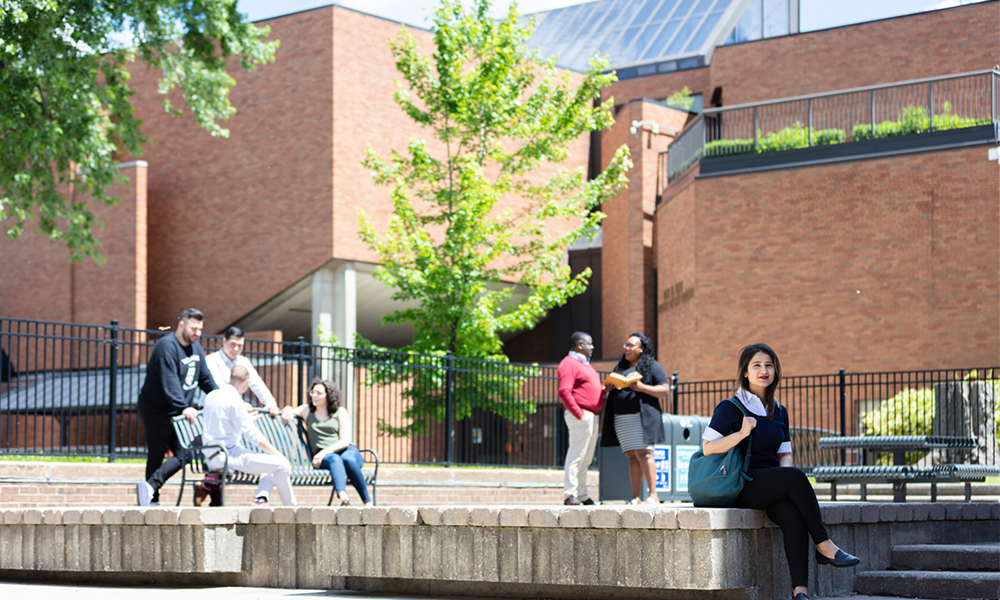
LOCATION:
Windsor, Ontario (licensure requirements)
ADMISSION REQUIREMENTS:
Information found here.
LAW DEGREES:
TUITION RATES:
-
JD – $ 9598.37 each term
-
LLM – $ 3285.06 each term
NOTABLE FACULTY MEMBERS:
Note: The law school is renovating its law building. Construction will begin in May 2020.
OTHER INFORMATION:
The law school prides itself in being “one of the most diverse law schools in Canada” with about 50 per cent of students speaking a second a language, and about 50 per cent of students being racialized students.
The law school offers experiential learning opportunities through its legal clinics and through its Indigenous Legal Orders Institute. The law school’s class action clinic, which is the first of its kind in North America, recently expanded to meet growing demand.
The law school is offering a free four-day training course this May, through which Canadian law students can obtain a Certificate in Patent Practice.
More information about the law school’s programs, admissions process and student organizations may be found here.
York University – Osgoode Hall Law School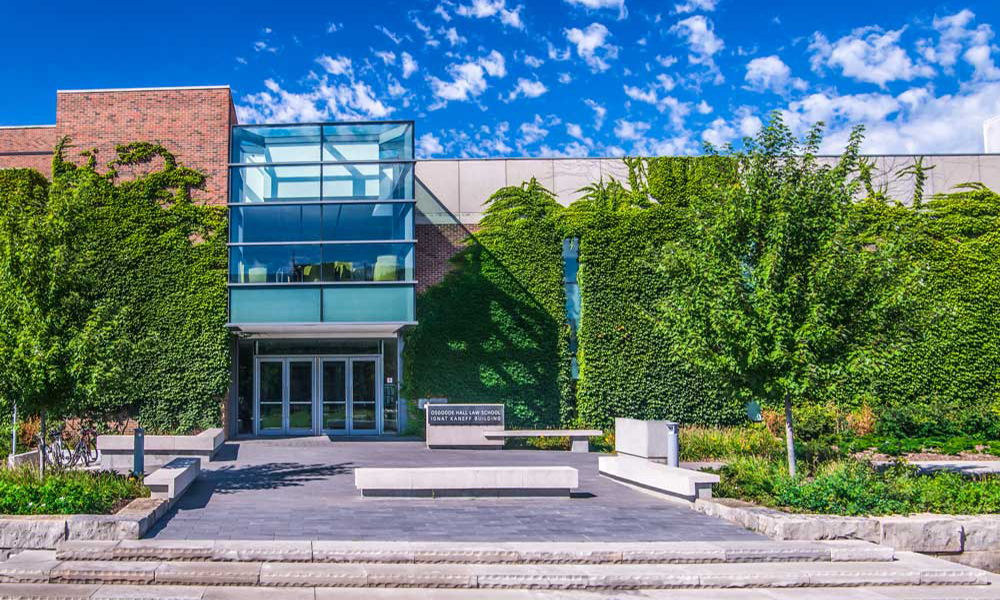
LOCATION:
Toronto, Ontario (licensure requirements)
LAW DEGREES AND ADMISSION REQUIREMENTS:
- JD/MBA with the Schulich School of Business at York
- JD/MES with the Faculty of Environmental Studies at York
- JD/MA in Philosophy with the Department of Philosophy at York
- JD/LLB (Civil) with the Faculté de droit - Université de Montréal, Universite de Montreal
TUITION RATES:
Juris Doctor (JD):
-
Domestic – $25,848.36/year (including ancillary fees)
-
International – $35,848.36/year (including ancillary fees)
-
Research LLM (domestic) – 4306.53 (full year/3 terms) (without additional supplementary fees)
-
Research LLM (international) – $18,825 (full year/3 terms) (without additional supplementary fees)
-
PhD (domestic) – $4306.53 (full year/3 terms) (without additional supplementary fees)
-
PhD (international) – $18,000 (full year/3 terms) (without additional supplementary fees)
Professional LLM:
Domestic:
-
Part-time fee – $3,800.79/term
-
Full-time fee – $7,601.58/term
-
Total tuition – $22,804.74
International:
-
Part-time fee – $6,716.62/term
-
Full-time fee –$13,433.25/term
-
Total tuition – $40,299.75
NOTABLE FACULTY MEMBERS:
OTHER INFORMATION:
JD students may receive financial assistance through the bursary program or through the income contingent loan program as well as awards, scholarships and prizes. Some experiential learning opportunities include clinical programs, internship programs and the Anishinaabe Law Camp. Demographic information on the student body may be found here.
As for LLM and PhD students, eligible students may avail of the Osgoode Graduate Student Awards. Demographic information on students in the graduate program may be found here.
The law school’s professional LLM program accepts professionals both with or without law degrees, provides 15 specializations, holds classes from two locations and offers distance learning options through simultaneous live webcasting.
The law school recently launched its Graduate Diploma in Law for Law Enforcement Professionals.
— With files from Anita Balakrishnan





